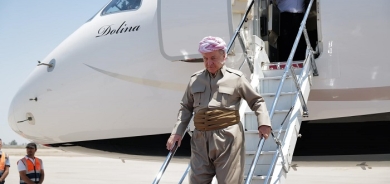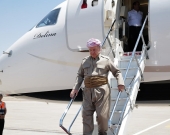Sulaimani’s Asian Masseuses Struggle After Duhok Riots

The request appeared to be in reaction to riots on the day before, when a local Muslim preacher in the border town of Zakho in Duhok province reportedly enticed those attending mass prayers to take on massage parlors and liquor stores. Following Friday prayer, an angry mob attacked and torched massage parlors, liquor stores and hotels.
Yi Yan is one of the many massage parlors that have opened in Iraqi Kurdistan in recent years. The businesses are often flooded with local Kurdish customers, but conservative religious and traditional figures in Kurdistan have often disapproved of the establishments.
Some Muslim clerics consider the massage business un-Islamic and against Kurdish traditions. Rumors have long circulated that some massage parlors are undercover brothels.
“We’re not here to do immoral things and the clothes we wear do not mean immorality,” said Winigya, a Chinese woman working at Yi Yan. “Our country’s culture considers that normal but some people here make judgments on your morality based on the type of clothes you wear.”
The incidents in Duhok sparked a serious debate about massage centers in Kurdistan’s public and political spheres. Many Kurds suspect the women offer prostitution, something many Muslims do not agree with. Islam forbids extra-marital sex and any physical contact between men and women.
Following the attacks in Duhok , a massage parlor was also torched in Sulaimani. The attack did not cause any casualties but raised concerns that the attacks in Duhok might ignite violence against such businesses.
Hian Li, 29, is another Chinese masseuse in Sulaimani. She said the rumors about their job hurts their business.
“But it’s all false,” she said. She said in her center, they only offer massages.
Mustafa Hama-Rahim, head of the Directorate of Tourism in Sulaimani, told Rudaw that his office has provided instructions and guidelines for massage parlors. He said that last month the businesses were again notified to meet government standards of hygiene and tourism.
According to Hama-Rahim, there are 18 massage parlors in Sulaimani that have a total of 90 Chinese women workers. The government requires those parlors to provide fitness devices, sauna, clean clothes and regular medical check-ups for their staff, said Hama-Rahim.
Hama-Rahim said the recent tensions surrounding massage parlors in Kurdistan might very well force some of the parlors’ owners to close down their businesses and return to their home countries.
Hama-Rahim considers the attacks on liquor and message sites as a blow to the efforts by Erbil, Kurdistan Region’s capital city, to be selected as the top touristic destination in the Middle East.
As concerns exist as to whether more attacks might occur, Zana Mohammed Salih, Sulaimani’s mayor, said the security forces are on alert and continue monitoring massage parlors, which are also frequented by foreigners.
“We don’t see anything suspicious that might endanger touristic sites… Life is normal,” said the mayor.
Karwan Subhan, a Sulaimani resident, first went to a massage parlor when he felt pain in his neck and shoulders.
He says he was told about “other stuff” happening in those parlors.
“But that wasn’t the case,” Subhan said. “I was there for 25 minutes and they gave me a massage. I felt like I was with a doctor.”
But resident Qadir Amin, 64, says the local government is trying to “turn Sulaimani into Europe and disseminate immorality here.”
Taha Ahmed Qaradaghi, an prthopaedist, said massage is a medically-recommended practice but warns in certain cases it can be detrimental.
“Those who suffer from spinal pain should not do massage because it could dislodge their joints,” said Qaradaghi.
He said that most massage parlors have qualified masseuses, and that hospitals also offer massage to patients who have a doctor’s prescription for physical therapy.












